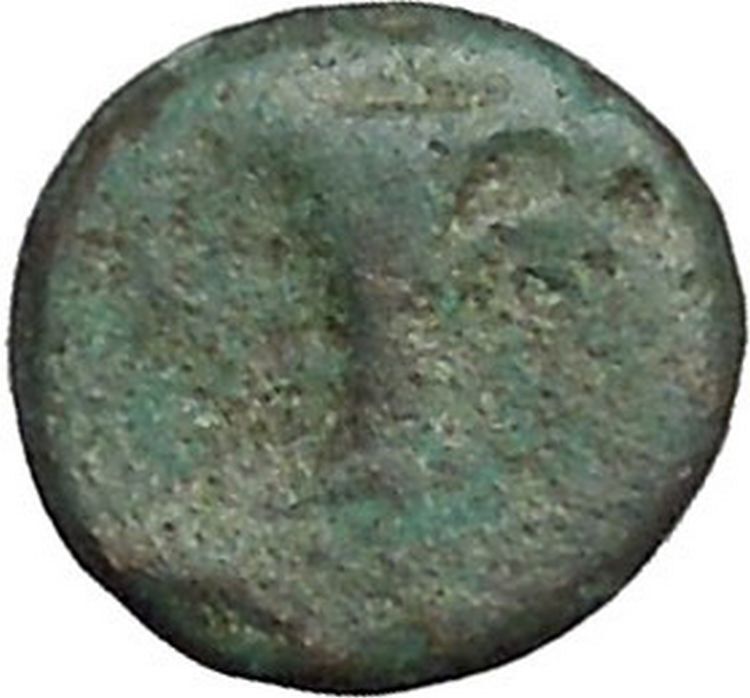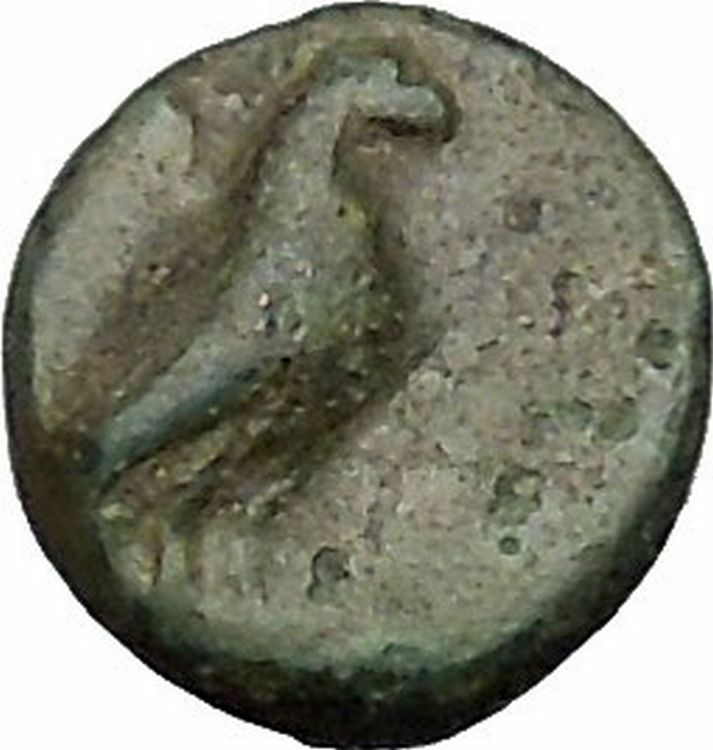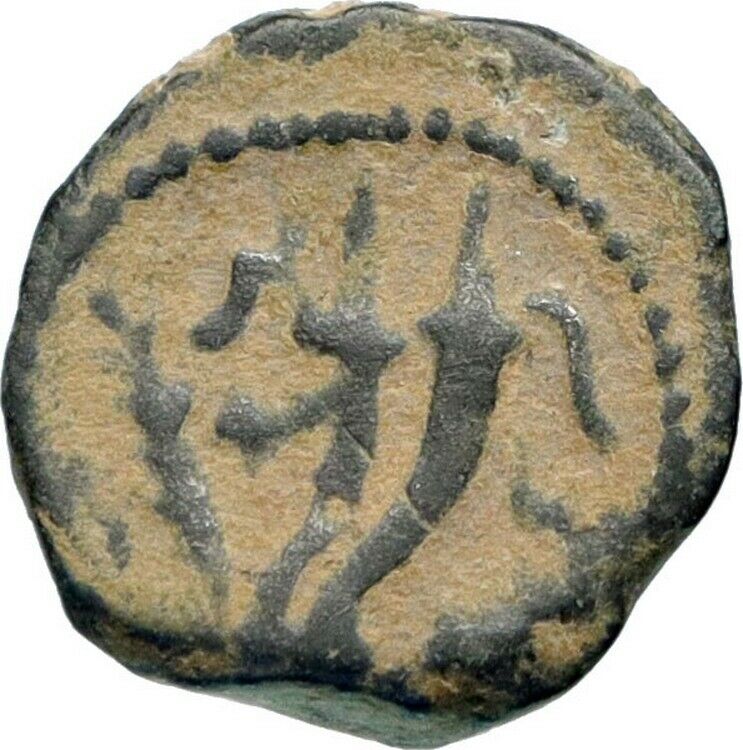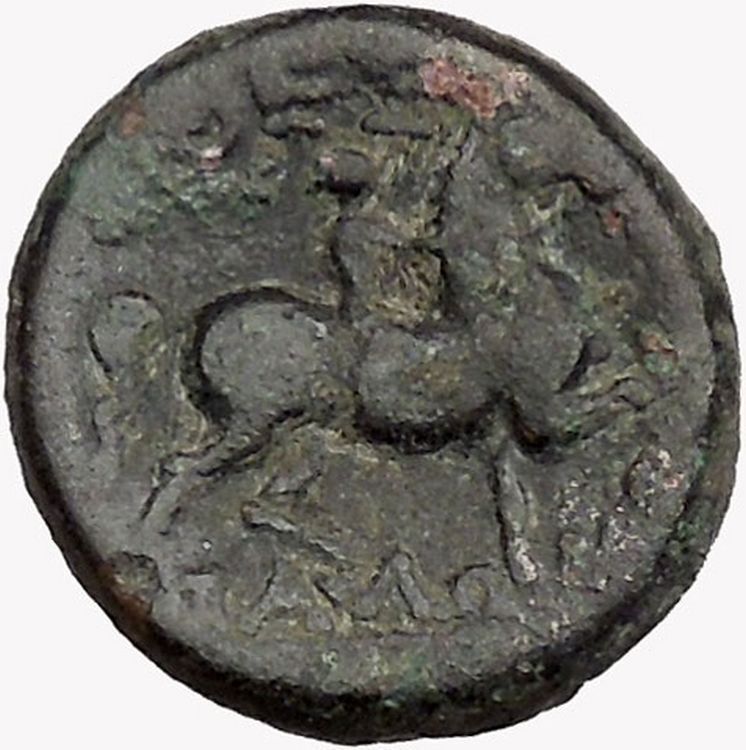|
Seleukid Kindom
Seleukos VI Epiphanes Nikator – King, circa 96-94 B.C.
Bronze 21mm (7.4 grams) Antioch on the Orontes mint
Reference: HGC 9, 1283 (RARE R2); SC 2424; SNG Spaer -.
Diademed head of Seleukos VI right.
ΒΑΣΙΛΕΩΣ ΣΕΛΕΥΚΟΥ ΕΠΙΦΑΝΟΥΣ ΝΙΚΑΤΟΡΟΣ, Apollo standing left, testing arrow and resting elbow on column to right; to left, monogram above A.
You are bidding on the exact item pictured, provided with a Certificate of Authenticity and Lifetime Guarantee of Authenticity.
Seleucus VI Epiphanes Nikator, ruler of the Hellenistic Seleucid kingdom, was the oldest son of Antiochus VIII Grypus and his wife Tryphaena.
The oldest son of Antiochus VIII Grypus and his wife Tryphaena and Crown Prince of Syria, in 96 BC, Seleucus defeated his half-uncle Antiochus IX Cyzicenus in revenge for his father’s death. However, the score was evened the next year (95 BC) by Antiochus X Eusebes, the son of Antiochus Cyzicenus, and Seleucus was forced to flee from Syria to Mopsuestia in Cilicia, where he set up his court, allegedly in luxurious style.
But the inhabitants of the province, who were already troubled by pirates, could not afford his extravagancies. Seleucus’ efforts to set up a new army was a heavy burden as well. A rebellion broke out and Seleucus was besieged in the hippodrome, which then seems to have been burnt down along with the king and his men.
Four of Seleucus’ brothers, including Antiochus XI Ephiphanes Philadelphus, Philip I Philadelphus, and Demetrius III Eucaerus, continued the devastating civil war against the other branch of the family and each other.
 The Seleucid Empire was a Hellenistic state ruled by the Seleucid dynasty founded by Seleucus I Nicator following the division of the empire created by Alexander the Great. Seleucus received Babylonia and, from there, expanded his dominions to include much of Alexander’s near eastern territories. At the height of its power, it included central Anatolia, the Levant, Mesopotamia, Kuwait, Persia, Afghanistan, Turkmenistan, and northwest parts of India. The Seleucid Empire was a Hellenistic state ruled by the Seleucid dynasty founded by Seleucus I Nicator following the division of the empire created by Alexander the Great. Seleucus received Babylonia and, from there, expanded his dominions to include much of Alexander’s near eastern territories. At the height of its power, it included central Anatolia, the Levant, Mesopotamia, Kuwait, Persia, Afghanistan, Turkmenistan, and northwest parts of India.
The Seleucid Empire was a major center of Hellenistic culture that maintained the preeminence of Greek customs where a Greek-Macedonian political elite dominated, mostly in the urban areas. The Greek population of the cities who formed the dominant elite were reinforced by emigration from Greece. Seleucid expansion into Anatolia and Greece was abruptly halted after decisive defeats at the hands of the Roman army. Their attempts to defeat their old enemy Ptolemaic Egypt were frustrated by Roman demands. Much of the eastern part of the empire was conquered by the Parthians under Mithridates I of Parthia in the mid-2nd century BC, yet the Seleucid kings continued to rule a rump state from the Seleukid Kingdom until the invasion by Armenian king Tigranes the Great and their ultimate overthrow by the Roman general Pompey.
<pat the="" end="" of="" 275="" bc="" question=""
<font color="#000000" first="" seleucid="" war
|





 The Seleucid Empire was a Hellenistic state ruled by the Seleucid dynasty founded by Seleucus I Nicator following the division of the empire created by Alexander the Great. Seleucus received Babylonia and, from there, expanded his dominions to include much of Alexander’s near eastern territories. At the height of its power, it included central Anatolia, the Levant, Mesopotamia, Kuwait, Persia, Afghanistan, Turkmenistan, and northwest parts of India.
The Seleucid Empire was a Hellenistic state ruled by the Seleucid dynasty founded by Seleucus I Nicator following the division of the empire created by Alexander the Great. Seleucus received Babylonia and, from there, expanded his dominions to include much of Alexander’s near eastern territories. At the height of its power, it included central Anatolia, the Levant, Mesopotamia, Kuwait, Persia, Afghanistan, Turkmenistan, and northwest parts of India.




